
INTODUCTION
.png) |
In an increasingly interconnected world facing complex challenges, Sustainable Development Goal 6 (SDG 6) stands as a beacon of hope, addressing the fundamental right to clean water and proper sanitation for all. As an integral part of the United Nations’ 2030 Agenda for Sustainable Development, SDG 6 underscores the profound significance of water resources and sanitation in shaping our well-being, health, and environmental harmony. Nitte (DU) has undertaken a transformative journey towards achieving the aspirations of SDG 6, exploring innovative approaches, community engagement, and holistic strategies that have not only contributed to responsible water management but also cultivated a culture of sustainability within and beyond its campus.
Targets to be achievedSix targets are set to achieve universal and equitable access to safe/affordable drinking water by 2030. The targets are as follows:
- Access to adequate, equitable sanitation and hygiene,
- Improve water quality,
- Increase water use efficiency,
- Ensure sustainable withdrawal and supply of fresh water,
- Protect water-related ecosystems, and
- Increase support/ strengthen the participation of local communities in improving water and sanitation management.
Nitte (DU) understands that the promotion of public health by prevention of diseases is crucial for ensuring the well-being of the communities. Nitte (DU) encourages building and maintaining proper sanitation facilities, including toilets, latrines, and hand washing stations on the campus, both in urban and rural areas. These facilities are accessible to all, including people with disabilities, the elderly, and children. Nitte (DU) has also developed policies that prioritize sanitation and hygiene. It has allocated sufficient budget and resources for sanitation infrastructure and programs.
Highlights & Key Achievements by NITTE (DU)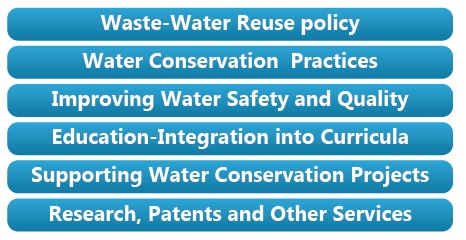
Nitte (DU) Treated Waste-Water Reuse policy
Nitte (DU) has a wastewater treatment and reuse policy. Treated Waste-Water Reuse policy on water conservation, wastewater generated on campus is collected and treated for non-potable uses like toilet flush, irrigation, and water to wash vehicles. It also complies with the Water Act 1974 standards under the State Pollution Control Board. In 2021, Nitte (DU) used around 7.3 lakh liters of water per day on the campus, and around 6 lakh liters of wastewater generated per day was recycled to be used for non-potable purposes. The policy developed is intended to treat wastewater as an economic resource. It is done with the selection and commission of the latest technological units/technologies
Use of recycled water for gardening and toilet flushing purposesThe wastewater is collected and treated in Sewage Treatment Plants (STP). Three campuses have individual STPs. The KSHEMA campus has an STP plant with a handling capacity of 4,00,000 liters/day. The university and Hospital campus have a plant of 8,00,000 liters/day and the Paneer campus has a plant handling 2,50,000 liters/day.
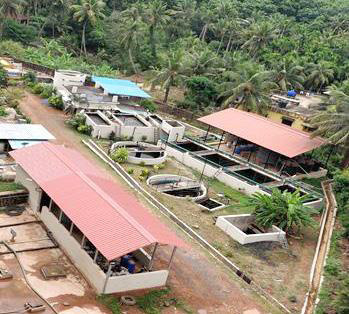
Sewage Treatment Plants: Nitte (DU) treats water as a valuable resource. It strives to achieve the zero discharge concept. It collects 100% of liquid wastewater and has established adequate treatment facilities so that 100% reuse of treated wastewater is implemented. Three Sewage Treatment plants are operational within the campus of 1450 KLD capacity. These are located in the JKSH Hospital campus (800 KLD),
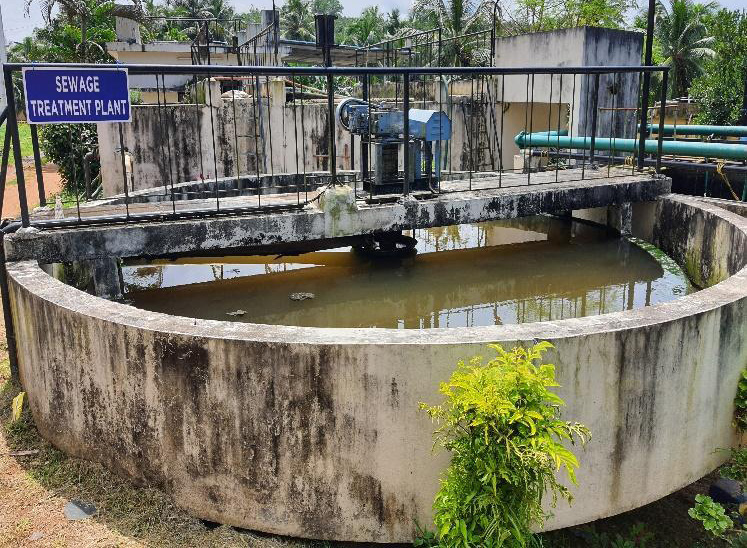
KSHEMA campus (400 KLD), and Paneer campus (250 KLD). Storm water drainage system is also operational in which rainwater from rooftops is collected using a separate pipeline, stored in raw water storage tanks, and treated in wastewater treatment plants consisting of Pressure sand filters and subsequently chlorinated for usage in domestic purposes. JKSH Charitable Hospital collects approximately 2 lakh liters, KSHEMA around 1.5 lakh liters, and the Paneer campus approximately 1 lakh liters of rainwater with a heavy shower of 30 minutes. Rainwater from roofs is collected using separate pipelines. The terrain of the university is molded for a natural flow of water. The stormwater is collected at the lowest point of the University campus based on contour mapping.
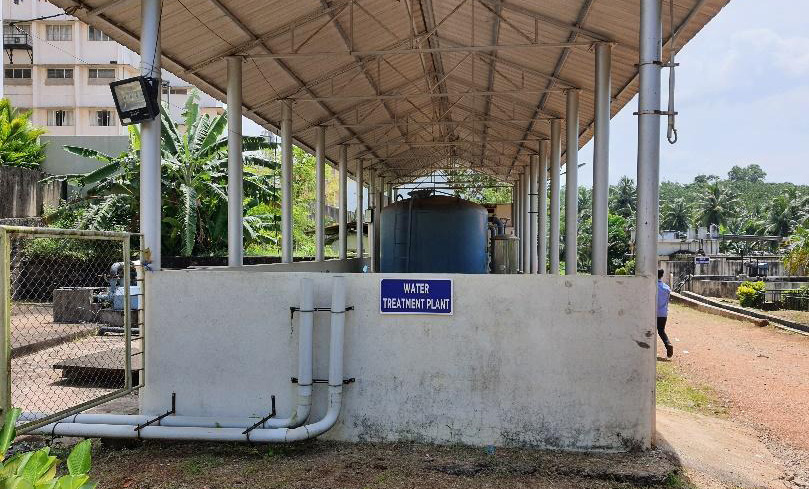
Toilets and Handwashing Stations
To inculcate the practice of hand washing among healthcare workers and patients in hospitals, WHO hand washing steps are displayed on all hand washing stations in the campus and its 21 rural satellite Centres.
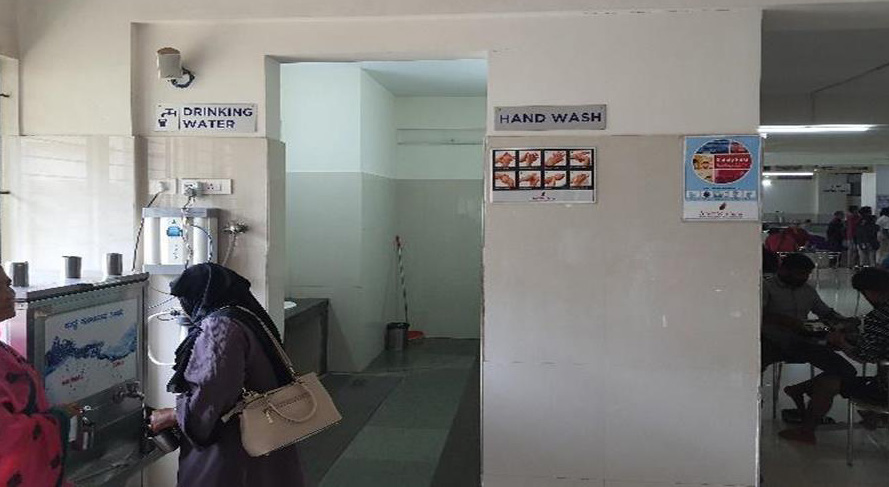
Clean Toilets and hand washing stations with WHO hand washing steps installed in hospitals and rural satellite centers.

Ensuring sustainable withdrawal and supply of fresh water
Nitte (DU) has adopted environmentally friendly methods for water conservation and optimum utilization of water. Key initiatives include
the “Every Drop Counts” campaign:The institution conducts the ‘Every Drop Counts’ campaign, led by the Green Brigadiers on campus. All drinking water outlets on campus feature educational displays to remind individuals of the importance of judicious water usage. Rainwater Harvesting Initiatives Nitte (DU) actively practices rainwater harvesting, utilizing open wells and water bodies for this purpose instead of borewells. Policies and strategies are geared towards protecting, conserving, and sustainably using freshwater resources. Rainwater harvesting is integrated into all three campuses of the University.Promotion of Off-Campus Rainwater Harvesting: Nitte (DU) also actively promotes rainwater harvesting beyond its campus borders. Through a dedicated pipeline, the university sources rainwater from an artificially created harvesting pond located outside the campus premises. This initiative encourages rainwater storage at an offcampus location.
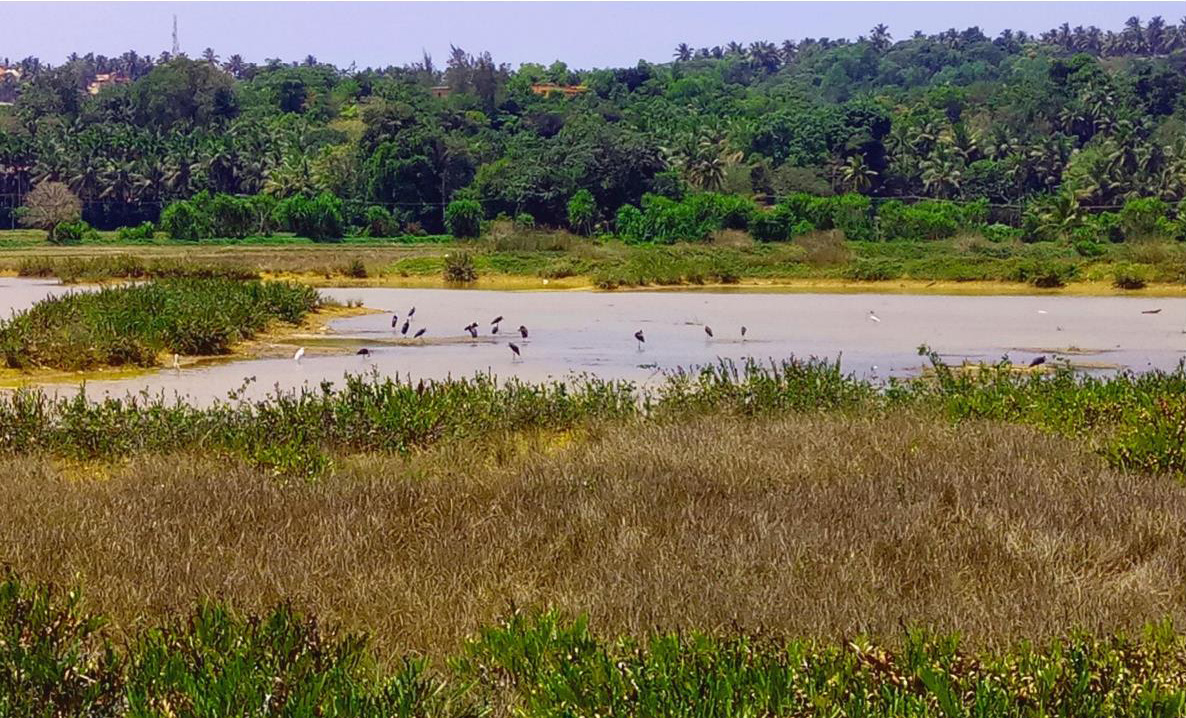
Rainwater storage ponds in the New Nitte University campus for collecting stormwater.
Building practices of water conservationImplementing Sustainable construction practices on the campus: Nitte (DU) consciously incorporates water conservation practices while designing and constructing buildings on its campus, aligning with its commitment to sustainability. These practices adhere to national building codes and guidelines while focusing on efficient water usage and stormwater management.
Construction is compliant with the National Building Code of India 2016 (NBC 2016). Standards IS1172 and IS2064 related to Water Supply, Drainage, and Sanitation are adhered to. Water conservation guidelines from Environmental Guidelines for Buildings, Ministry of Environment, Forests & Climate Change, Government of India are also followed.
Some of the practices followed are:- Use of water retaining material like cloth/ gunny bags etc. during curing
- Ponding” for retaining water on flat concrete structures for curing
- Use of curing chemicals/techniques to minimize water requirements
- Use of non-potable water for construction activities
- Use of water-efficient plumbing fixtures like push-cock taps
- Use of sensor-based taps
- Use of aerators, pressure inhibitors and flow regulators for ensuring constant flow
- Separate pipelines for potable water, water for recycling and treated water are provisioned for during construction
- Provision for management of stormwater
- Rainwater storage ponds have been created in the campus for storage of stormwater
- Rainwater from an artificially created storage pond from an external location near the campus is used. A MoU has been signed with the land-owner for the use of this water
- Use of recycled water for flushing and gardening.
Water metering is commonly practiced in all the constituent colleges of Nitte with wellestablished water utilities, where meters are installed to measure consumption rates in the majority of households and buildings.
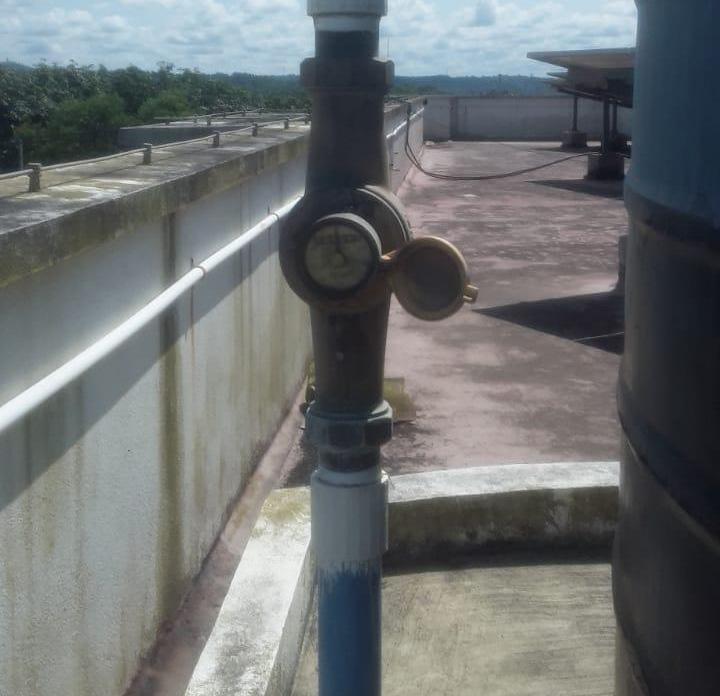
Improving water safety and quality
Nitte (DU) ensures access to clean drinking water for students, employees, and visitors. Clean drinking water is available through UV-based water purifier dispensers. Quality assurance through regular testing: Water quality is assessed periodically through in-house and external testing. All major buildings have separate storage facilities for potable and nonpotable water. Segregated storage tanks and pipelines are available for potable, storm, and grey water.
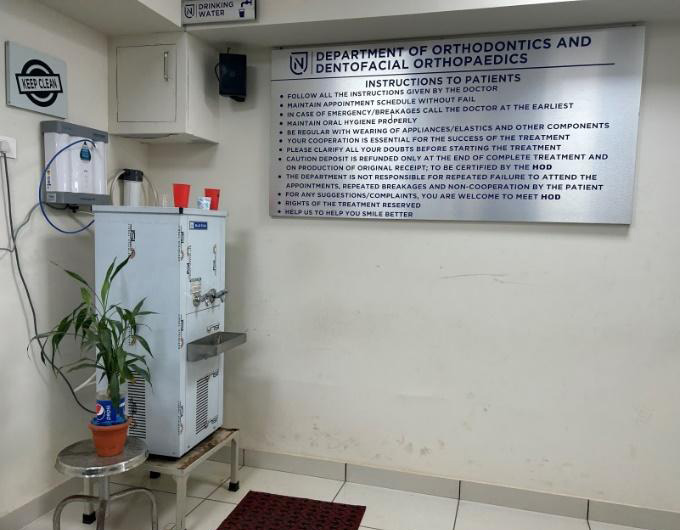
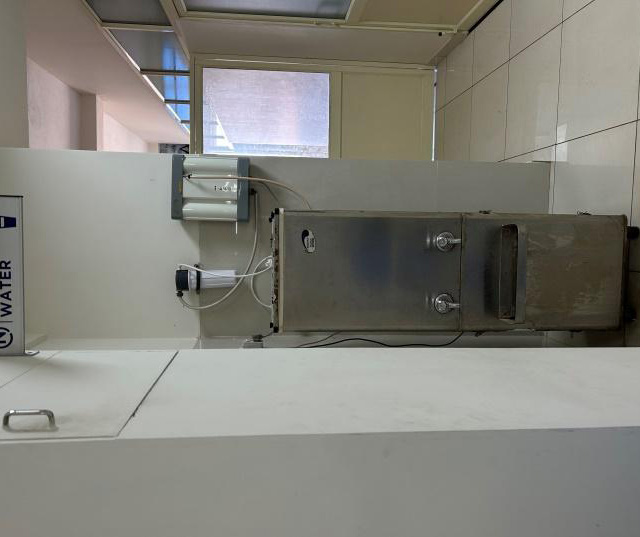
Promoting efficient water use practices
Nitte (DU) has taken steps to adopt waterefficient appliances and fixtures across its campuses. Traditional taps are being replaced by self-limited push-cock-based taps and sensorbased taps to reduce water wastage. Energyefficient shower heads have been installed in areas with high water consumption, such as hospitals and hostels.
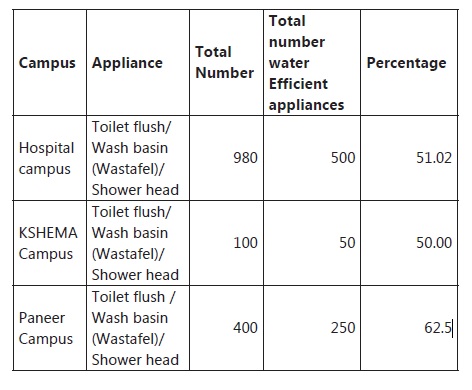
Water-Efficient Appliances implemented
- Water Efficient Shower Head (rated from 1.5- 2.0 gallons per minute)
- Replacement policy for leaking taps
- Installing displacements devices inside toilet cisterns
- Push cock taps are being used as replacement for ordinary taps to reduce water wastage
- Use of adjustable sprinklers in the garden
- Installation of drip irrigation system in the college campus
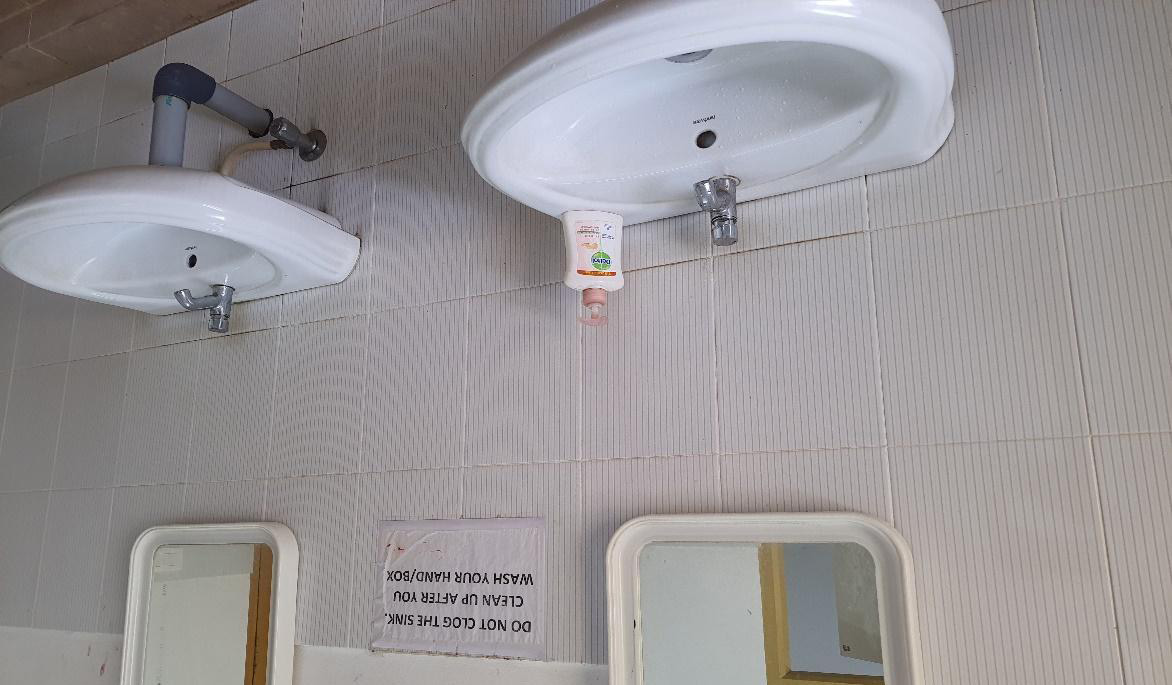
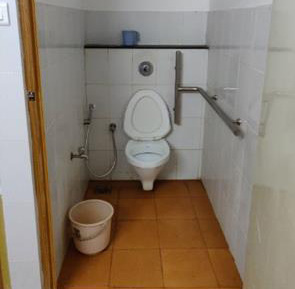
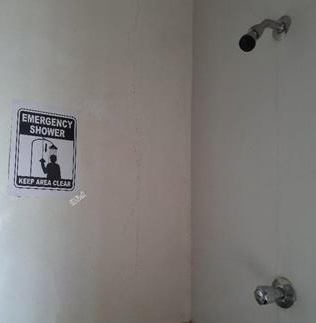
SDG 6 and Education Integration into Curricula
Nitte (DU) incorporates SDG 6 principles into various educational programs. Early clinical exposure for First-year MBBS students involves the ‘Concept of Solid waste and sewage disposal at household level’. Several courses Course (MBBS, MD/MS, MSc Nursing, BSc Nursing, BSc Biomedical Sciences, BSc Medical Imaging, and Technology, BSc Anesthesiology and Operation theatre technology, BSc Medical Laboratory Technology, and Bachelor of Architecture), have inbuilt curricula addressing various aspects such as importance of aquatic ecosystem, influence of climate change water resource, ill effects of water pollution, Laws in place for prevention and control of water pollution.
Raising awareness about water-related issues: Nitte (DU) undertakes sustained campaigns and conducts training programs about Water Conservation to encourage and sensitize students and staff to save water within the campus. Some of the recent activities related to water conservation include Modules on environmental sustainability, including water conservation, which are included in the formal curriculum of most programs.
A short video titled ‘Jala’ was made and released on YouTube on the occasion of World Water Day.https://youtu.be/ioCObLAP2F0.
Competitions to create programs- A short video competition on the theme ‘Zero Plastic’ to raise awareness of plastic waste reduction was organized by the Nitte Institute of Architecture in collaboration with the Indian Green Building Council from 23rd-29th January 2022. Winners of the above event were felicitated on the occasion of World Water Day at the Institute. The competition intended to spread awareness of the adverse effects of plastic and share some innovative practices for reducing plastic consumption and managing waste through smart solutions.
- A comic book workshop titled ‘Winter School’ to promote creative interpretations of environmental issues was organized by the Nitte Institute of Architecture in January 2022. The workshop sensitized students on various details of issue identification, presentation, and focusing on city-water relationships. Students interacted with locals and gathered information related to how water plays an important role in their daily lives.
- A field visit to the Adyanadka plantation site to generate awareness of vernacular water conservation systems was organized by the Nitte Institute of Architecture on 13 July 2022. Students got the opportunity to interact with traditional practitioners of water conservation.
- The program on “Water Conservation and Irrigation Practices for Farmers” in association with the Department of Horticulture and Rotary Club Kinnigoli was conducted on 27 September 2022 at Rotary Convention Hall, Kinnigoli by the University Centre for Science Education & Research (NUCSER) under the Sustainable Development Goals initiative of the University. Farmers, school children, postgraduate students, teaching & non-teaching staff of NUCSER attended the program. The program highlighted the importance of water in every sector of the community focusing on the process and the technologies of rainwater harvesting.
- Nitte Institute of Architecture organized a mid-semester review of the Urban Studio 2022 titled “Design Review of Urban Studio: Towards Innovative Urban Interventions” on 28 September 2022 with the intention of making students aware of people-centric and context-specific design intervention possibilities in urban areas with a special emphasis on intervening in natural urban water resources like lakes and rivers. During this review, students visited various urban locations in Bengaluru and documented a range of urban challenges across eight different sites within the city.”
- Nitte Institute of Architecture hosted a field visit to Old Bandar port of Mangalore on 2/12/2022 as part of Placemaking Week with the intention of understanding and identifying the opportunities for urban public space creation and waterfront development.
- Sustainable goal lecture series under SDG: A guest lecture titled ‘Smart ideas for environment conservation’ was organized by the Nitte Institute of Architecture on World Water Day (22 March 2022). Students were introduced to a new way of creating smart solutions to the commonly known problems of water conservation in villages and cities. It helped students and faculty to identify opportunities in the field of water management, conservation, and developing smart technologies.
- Nitte Institute of Architecture organized a guest lecture on “Sustainable buildings and technologies” with the intention of promoting smart technology innovations in the buildings on the 25th & 26th of September 2022 with an emphasis on optimizing energy, materials, and water consumption needs. The resource persons were Dr. Monto Mani, a Professor from IISc Bengaluru, and Ms. Suchi Priyadarshini, a PMRF research scholar from IISc Bengaluru. This lecture highlighted the various fundamentals of sustainability applications in buildings. Experts educated students about digital tools to support innovation in building designs.

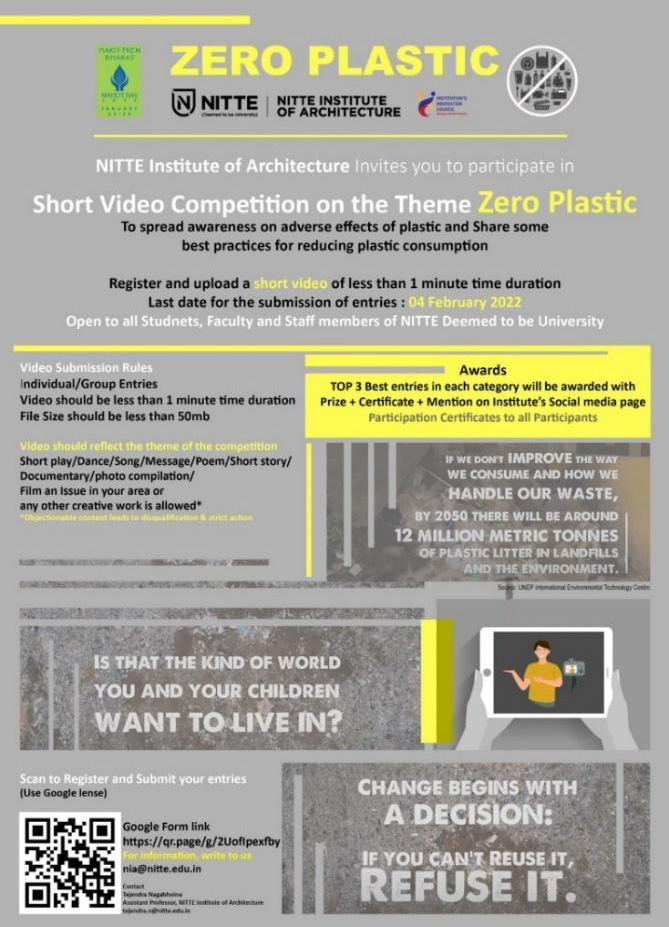
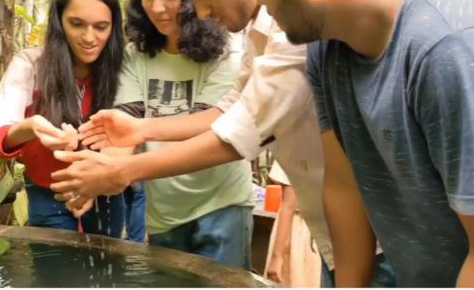
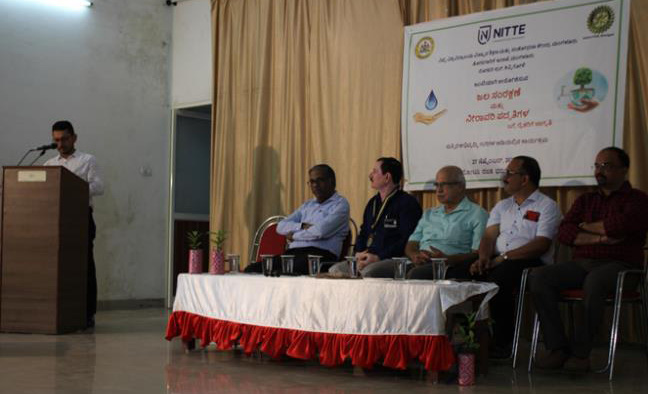
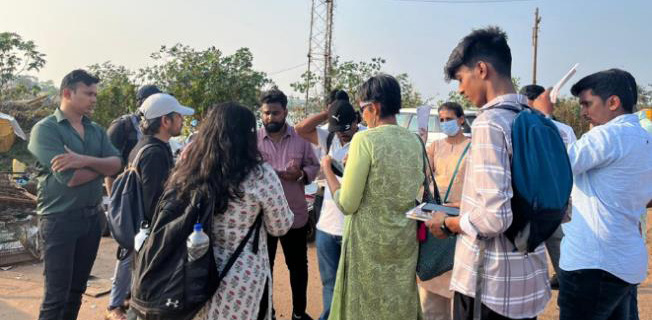
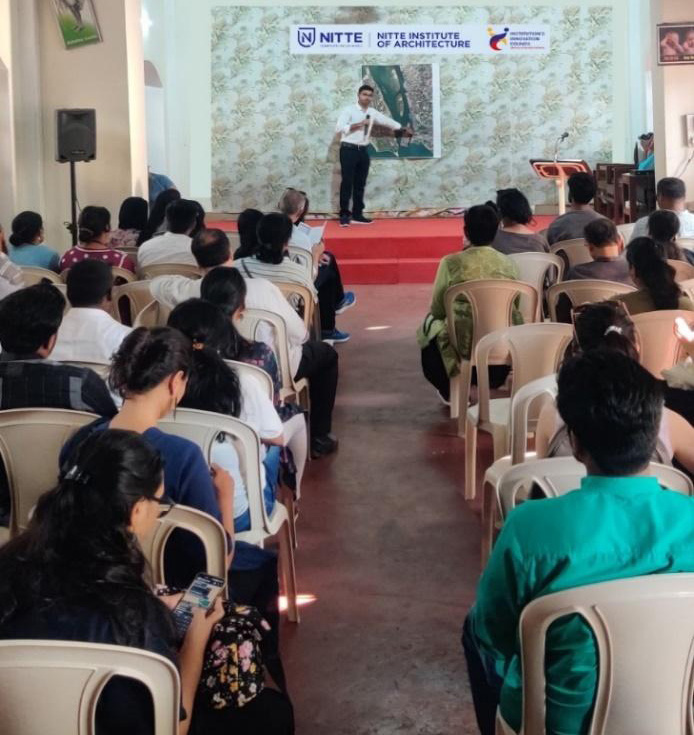
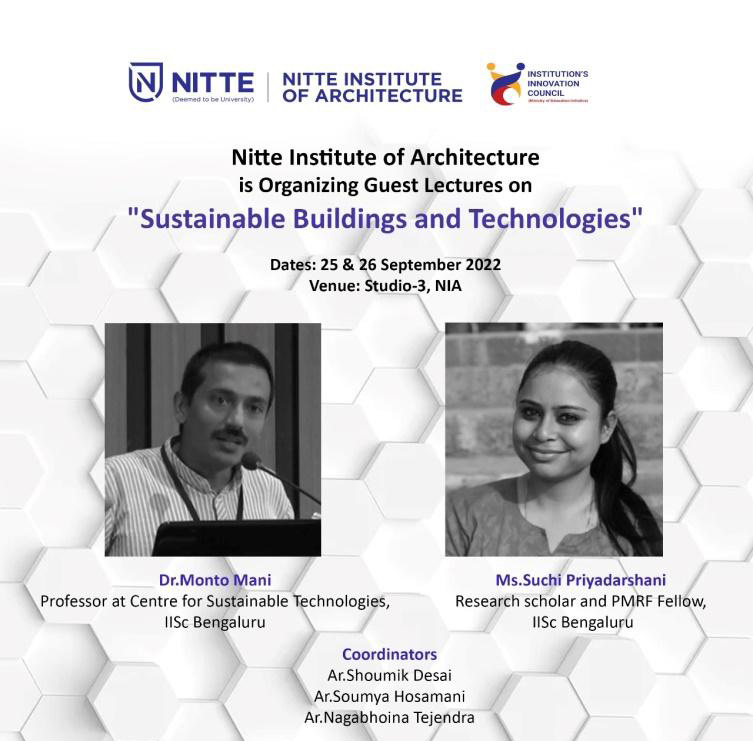
Nitte (DU) takes an active role in endorsing water conservation initiatives, and facilitating the implementation of sustainable projects aimed at protecting our precious water resources. One such project, initiated by Mr. Nikhil Shah, Assistant Professor at the Nitte Institute of Architecture, delves into the intricate connection between the city and its river, particularly examining the effects of various developments along the riverbanks on the overall sustainability of Surat, Gujarat, India. This endeavor is made possible through the support of the Nagar Nadi Fellowship provided by the People’s Resource Centre (PRC).
A study on “Evaluating the Effects of Urbanization, Land Use Shifts, and Water Quality in the Coastal Areas of Dakshina Kannada District, Karnataka, India, Using Remote Sensing and Geospatial Analysis” was conducted by Dr. Mackwin Kenwood D’mello and the team from the department of public health. This study addresses the dynamics of coastal areas in Dakshina Kannada district by analyzing land use/ land cover changes, understanding the impacts of urbanization, and assessing water quality, thus providing valuable insights for informed decision-making, sustainable development, and safeguarding public health in the region.
Other project proposals developed by students of Nitte (DU)- Restoration of the Vrishabhavathi River: A student project led by Ms. Kavya Amin from the Nitte Institute of Architecture focuses on addressing the infrastructure challenges of the Vrishabhavathi River. The proposal aims to integrate housing typologies and urban green spaces, offering an effective approach to enhance the urban environment.
- Promotion of Off-Campus Rainwater Harvesting: Nitte (DU) actively promotes rainwater harvesting beyond its campus borders. Through a dedicated pipeline, the university sources rainwater from an artificially created harvesting pond located outside the campus premises. This initiative encourages rainwater storage at an offcampus location.
- The Water Museum: Conceived by Vidwath Kumar, a third-semester student at the Nitte Institute of Architecture, this project is designed to provide a platform for innovative ideas. It encourages experimentation and creation based on innovative technologies for raising the groundwater table.
- Revitalization Project of Sulthan Battery and Surroundings: Led by Mr. Harikiran, Ms. Shahana, and Ms. Nabeela from the Nitte Institute of Architecture, this student project focuses on rejuvenating Sulthan Battery and its immediate surroundings.
- The Urban Studio-2021: Organized by the Nitte Institute of Architecture, the Urban Studio-2021 delves into the relationship between water and the city in the Mangalore region. Its primary aim is to observe and identify critical issues and challenges related to water bodies and the community across different scales.
- Project Bindu: This project’s objective is to reestablish the lost connection between the river and the city. It aims to create memorable experiences and activities in and around the river that are celebrated by the community. Additionally, it contributes to the city’s enhancement and connects people back to its history and culture.
- A patent titled ‘Technology for removal of Cadmium from contaminated water using non-living micro particular biomass’ was filed by Dr. Smitha Hegde and Ms Aastha Srinivasa from Nitte University Centre for Science Education and Research.
- Dr Sharad Anand, completed his PhD titled ‘A study of hygiene and sanitation, biomedical waste disposal and hospital pharmacy management in tertiary care hospital’ under the guidance of Dr CS Shastry.
- In 2022, a study titled ‘Nitrogen Dependency in Rhamnolipid-Mediated Degradation of Petroleum Crude Oil by Indigenous Pseudomonas sp. WD23 in Seawater’ was conducted by Goveas and colleagues. This study has been published in the internationally recognized journal “Chemosphere” (Q1 journal) with ISSN 00456535.
- A study titled ‘Assessment of Physicochemical Characteristics of Various Water Sources’ was conducted by Chetan et al. 2022 and has been published in the Journal of Pharmaceutical Negative Results.
Bacteriological, and chemical analysis of water is undertaken in villages as a part of outreach activity in field practice areas of KSHEMA by the Department of Community Medicine.
Residual chlorine estimation of water is conducted every week in all the student hostels, hospitals, canteens, and Central kitchen by the Department of Community Medicine, KSHEMA.
Timely interventions and corrective actions are initiated to ensure the availability of potable water to all within the campus 24x7.
Monthly bacteriological and chemical analysis of water is conducted by the Department of Community Medicine and Nitte University Centre for Science Education and Research in all the student hostels, hospitals, canteens, and central kitchen.
The National Service Scheme volunteers conduct campaigns to raise awareness about water conservation.

